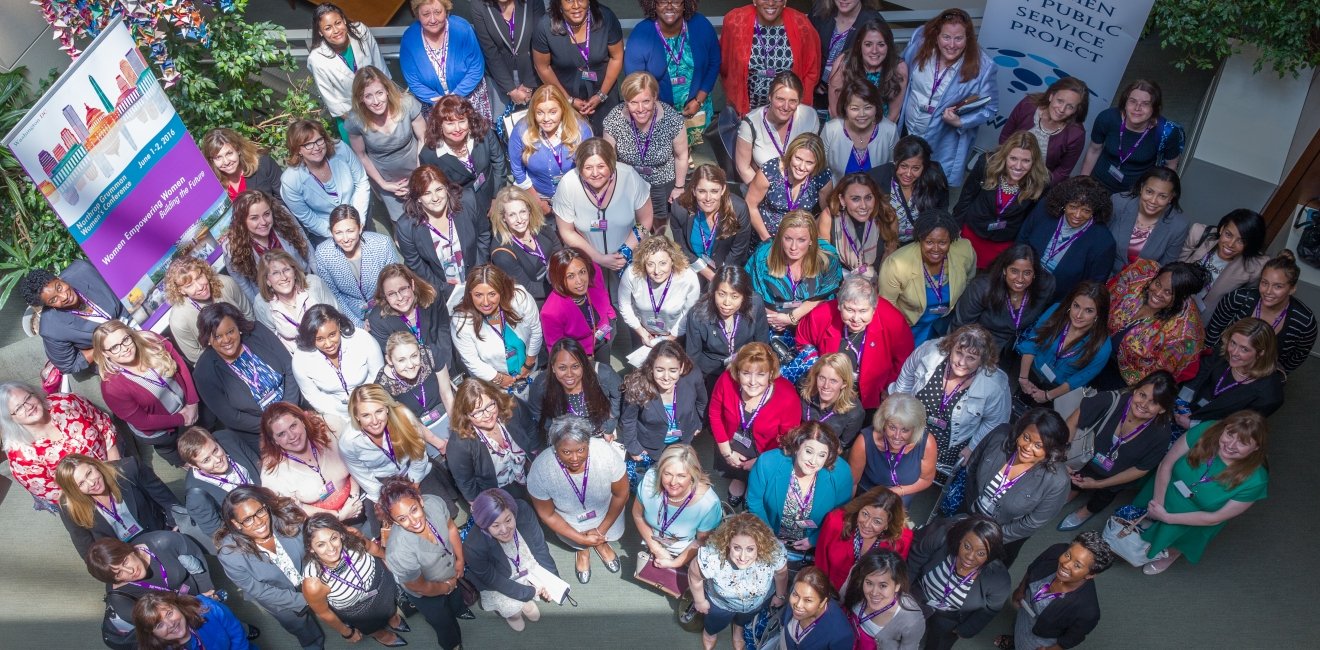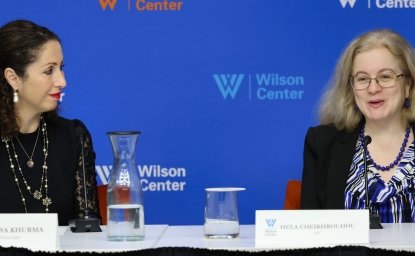On June 1, 2016, the Women in Public Service Project hosted participants from the Northrop Grumman Women’s Leadership Conference for a series of panels entitled, “Women’s Global Leadership: The Women and the Issues.” The Honorable Jane Harman, Director, President and CEO of the Wilson Center, offered opening remarks. “When I first ran for Congress,” Harman remarked, “there were virtually no women in the security space.” Drawing on the experiences from her time in Congress, Congresswoman Harman commended the strides the U.S. has made in incorporating more women into leadership in the security space over the past 25 years.
Following Congresswoman Jane Harman’s remarks, May Al-Toukhi, Senior Market Intelligence Analyst from Northrop Grumman, discussed “the fight for women to work globally.” Al-Touki pointed out that while she is grateful for the women who paved the way before her generation, there are still so many challenges that women continue to face. With a background in politics, Al-Touki shared her experience struggling to find affordable daycare and the difficulty of breaking into a male-dominated workforce in Saudi Arabia. Al-Touki stated, “We should not have to choose between our career and our families…we shouldn’t have to make that choice.”
The first panel, “International Women Judges: The Role of Gender and Women’s Issues in the Judiciary” featured The Honorable Fatima Ougaddoum, Court of Appeals, Casablanca, Morocco; The Honorable Norah Jean-François, Court of Appeals, Port-au-Prince, Haiti; Claudia Escobar, Robert G. James Scholar at Risk Fellow, Radcliffe Institute, Harvard University and former judge, Fifth Appellate Court of Guatemala; and Gwen K. Young, Director of the Global Women’s Leadership Initiative and Women in Public Service Project at the Wilson Center as moderator.
Gwen K. Young opened the panel by painting a picture of the status of female judiciaries around the world and asking each panelist to share further insight on the status of female judiciaries in their respective countries. Judge Escobar, whose mother was a family judge in Guatemala, discussed endemic violence and weak of rule of law as an ongoing challenge to judicial independence in Guatemala. She stressed the need for strong institutions to build a stronger country and highlighted the government’s attempt to hold the appointment process more accountable. Ms. Young posed a follow-up question, inquiring if there were gender provisions in the Guatemalan constitution. To this, Judge Escobar responded “Formally no, but there is relative equality in the Guatemalan judiciary.”
Judge Fatima Ougaddoum continued the discussion, stating that Morocco does have equality provisions. Since 2008, significant changes have occurred in Moroccan courts where the number of female judges changed from 611 to 989 judges in 2016, and women now comprise approximately 25 percent of Moroccan judicial appointments. Judge Ougaddoum asserted the “challenges women face in Morocco has nothing to do with the system, but rather the mentality of the men working.” She shed light on the obstacles women face in the pursuit of leadership, as well as the common occurrence of women only being allotted cases that relate to social issues. Judge Norah Jean-François, whose background is in microeconomics and public administration, also discussed the challenges she faced when she decided to enter the judiciary, where the number of women is only 10 percent. Through her work with the Haitian chapter of the International Association for Women Judges she founded in 2001, she grew the number of women members from 11 to 70. The panelists answered questions from the audience which focused on the role of men in the fight for equality and addressing the salary gap between men and women. Judge Escobar remarked that while men and women are required to receive equal pay, structural inequalities warrant men in higher positions and therefore higher salaries.
The second panel entitled, “Global Women’s Leadership Initiative: The Women in Public Service Project” featured the following panelists: Her Excellency Thelma Phillip-Browne, Ambassador of St Kitts and Nevis to the United States; Professor Federica Bindi, Director of the Foreign Policy Initiative at the Institute for Women’s Policy Research and Senior Fellow at the Center for Transatlantic Relations at SAIS Johns Hopkins in Washington D.C.; and Gwen K. Young, Director of the Global Women’s Leadership Initiative and Women in Public Service Project. The panel was moderated by Indira Lakshmanan, Senior Foreign Policy Correspondent.
Ms. Young introduced the mission and goals of the Women in Public Service Project. She highlighted that while only 17 percent of U.S. government appointments are filled by women, they are predominantly placed in niche areas pertaining to social issues. Ms. Young pointed out that 2/3 of female legislators come from New York and California, thus revealing further structural barriers in the United States.
Ms. Lakshmann opened the panel with questions regarding women’s path into public service. A former doctor, Ambassador Phillip-Brown ascertained that women already possess many of the skills needed to enter the diplomatic service. Professor Bindi described the first time she felt the weight of the systemic biases against women when she was mistaken as a secretary as opposed to a diplomat, as well as the unequal emphasis on female versus male attire.
Ms. Lakshmann sparked discussion when she asked for “a realistic way of empowering women’s leadership in a country like the United States” where affirmative action is still a contentious issue. Young mentioned one option of using legislation to help change the landscape regarding women’s leadership. Professor Bindi remarked that even gaining momentum behind the quota system in other places in the globe like Rwanda, took time and argued for the need for more research to strengthen the claim for gender equality in public service.
The audience posed questions regarding what can be done in the corporate world and mainstream society to promote a cultural shift in women’s leadership and politics. Ms. Young addressed the role the private sector can play in the push for gender equality through cross-sector partnerships, sharing of best practices and funding for research on women’s issues. Professor Bindi emphasized the need to raise a generation of children accustomed to gender equality and women’s leadership by advocating for male partners to give greater voice to gender parity issues. Ambassador Phillip-Brown ended the discussion by calling all women to “bloom where you’re planted” and recognize the value they bring.
Sandra J. Evers-Manly, Vice President of Global Corporate Responsibility at Northrop Grumman, closed the event by sharing the following African proverb: “To raise a boy into a man, you raise an individual. To raise a girl into a woman, you raise a nation. She applauded Northrop Grumman Chairman, CEO, and President, Wes Bush, for his commitment to making a difference in the company’s leadership. The company has achieved 50-50 gender parity under his leadership.






